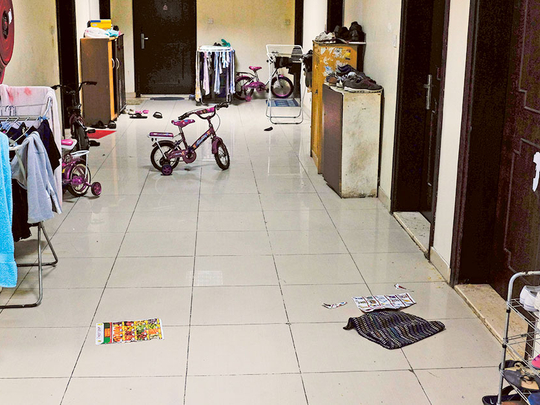
Dubai: Everybody needs good neighbours, according to the theme song from the famous Australian soap opera of the ’80s.
However, some of us are unlucky enough to have bad neighbours.
And, the issues are legion — from untied garbage bags on the floor of the garbage room and barking dogs at the end of the hallway to loud children playing in the corridors after midnight and adults partying until sunrise.
So what should one do?
Dubai Municipality says if you have any complaint, just dial 800 900 and file a complaint. However, not all solutions to complaints are in the hands of the municipality.
Some problems need to be dealt with either by the landlord or the police.
Ebrahim Abdullah Al Dashti, head of the Contact Centre Section at the municipality, told Gulf News that there are different sections at the municipality dealing with different complaints.
However, some of them should be directed to the police on 901 such as those related to noise.
“As a municipality, we don’t interfere in certain cases,” a municipality employee at the hotline desk said.
Who is responsible?
Complaints regarding issues inside the building, which is private property, are not under the jurisdiction of the municipality, explained the employee, who declined to give his name because he is not allowed to talk to the press.
However, issues that are outside the building or constitute a danger to people or tarnish the public image fall under the authority of the municipality, the employee noted.
For example, leaving garbage on the ground of the garbage room, or even in the corridor, instead of throwing it inside the chute is the responsibility of the landlord.
But leaving garbage bags outside garbage skips located outside the premises comes under the municipality control, and people can complain about those who dispose of garbage outside the metal containers.
“The same thing applies to those who dry their laundry outside their balconies. This is considered tarnishing the public image”, and comes under the authority of the municipality, added the employee.
Both landlords and police can handle the issue of noise, he noted.
Partying like there's no tomorrow
Some tenants complain about neighbours who party till sunrise, with no consideration for others.
While some contracts state clearly pets are not allowed in some buildings, some people opt to ignore this.
“What to do, madam? They don’t listen,” said a security guard in one of the buildings that does not allow pets, when one tenant complained of another tenant passing by cradling her pet.
“I have had the little dog for less than a year now. It was an abandoned dog, and I kept it because it doesn’t make any noise and the children wanted it,” said another tenant in the same building.
“We see many people who have pets in the building and I don’t think any of them has a pet that makes a noise,” added the same tenant, who asked to be identified only as Sam.
However, another woman told Gulf News she had to vacate her three-bedroom apartment in Dubai a few years back because the building management repeatedly reminded her that no pets are allowed in the building and that neighbours were complaining. She moved to a villa.
“I lost part of the rent because I had to move out earlier,” she said.
“Whoever saw my dog was amazed by its manners, gentleness and loving nature,” added the woman who said her dog is clean and that she grooms it daily.
However, many argue that tenants should respect rules and other tenants’ right to live in pets-free buildings.
One tenant recalls coming back from work late and saw a dog barking at the end of the corridor.
According to Dubai Municipality’s rules, if the pet is left unleashed or without its owner, complaints can be filed with the municipality, which will confiscate it.
Asked about the most common complaints the municipality received in 2014, Al Dashti said they include sewage blockage, hygiene issues in food outlets, and matters related to main streets.








